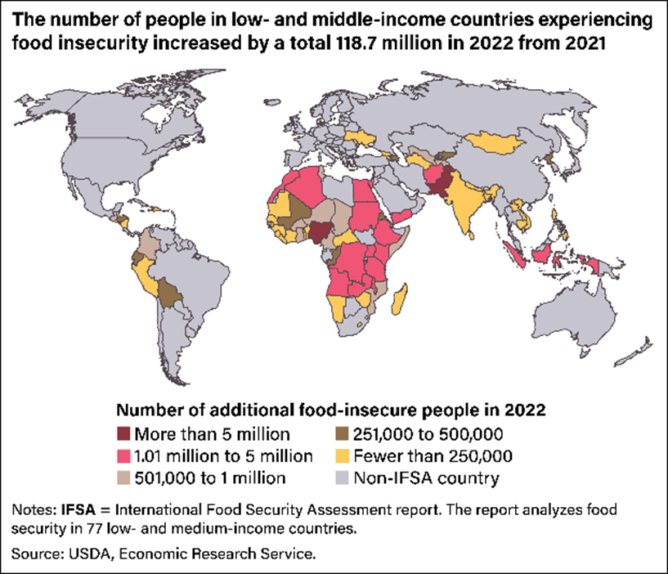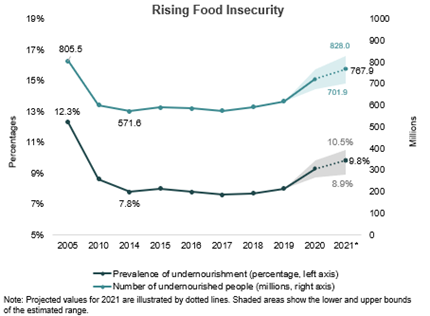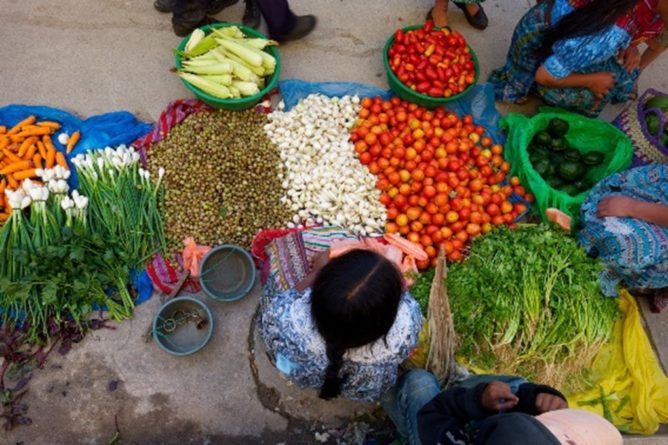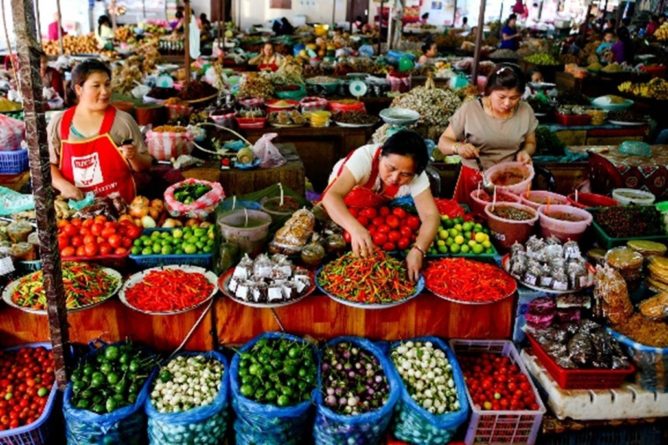Investing in Food Security Tackles Crisis and Conflict
Equilibres mondiaux | Les pays
Écrit pour la session 44 – Assurer la sécurité alimentaire
Investing in food security is investing in global security and a better future for all. Yet, food insecurity remains a persistent problem, with an estimated 1.3 billion people food insecure in 2022.[1] Tragically, this number continues to rise, reversing progress and disproportionately harming already marginalised populations.[2] This food crisis is intrinsically linked with multiple other crises, including poverty, debt distress, conflict, and climate change, which compound and reverse the progress made to increase resiliency and security.[3] Only by addressing the interconnections between these crises can we make significant progress overcoming global insecurity.


Crises and Hunger
Food price inflation and challenges relating to global food exportation and supply are widespread and growing.[4] Less food is available and that which is available is more expensive. Conflicts are at their highest level since the United Nations’ creation, with an estimated two billion people living in countries impacted by conflict.[5] Climate shocks are also increasing, with more droughts, floods, heatwaves, and other weather events.[6] These crises are disrupting agricultural production and distribution; displacing people and reducing their resources; and making it even more difficult for people to access food. This is set against the backdrop of slowing economic growth, adding to the persistent impact of COVID-19 and further squeezing Government budgets.
Crisis drives hunger and hunger feeds crisis. Tackling global crises therefore requires a multi-faceted approach founded on sustainable agriculture and food systems. For instance, food insecurity often fuels outbreaks of social unrest and conflict, which, in turn, further worsen food insecurity. In a 2021 Resolution, the United Nations recognized this paradigm and called for the preservation of food systems and markets during crisis and conflict, acknowledging that stronger global food systems are critical for promoting broader international security and peace.[7] As part of this, inclusivity in food systems is key to effective and sustainable crisis response.

Inclusive Responses
Eighty per cent of the world’s poorest people live in rural areas.[8] Often the rural poor who have contributed the least to the crises causing or worsening food insecurity bear the brunt of the consequences, while facing additional barriers from discrimination, fewer resources, and limited inclusion within decision-making. They also hold many of the solutions. Up to 150 million people would be lifted out of hunger if women farmers had the same productive resource access as men.[9] Indigenous peoples possess invaluable knowledge and practices that can contribute to building sustainable food systems and mitigating climate change harms.[10] Young people represent a significant demographic in the context of food security, so engaging young people in food-related activities builds a sustainable and skilled workforce for the future. In addition to multifaceted solutions, we need inclusive solutions.
By working together, we can progress toward reducing food insecurity and creating a more equitable and sustainable future for all. This is part of IFAD’s mission. IFAD was created in the 1970s as the global community’s response to the then food and fuel crisis. It was purpose-built to channel investment into sustainable food systems and food security in developing countries, driving development impact, food security and greater social stability in poor rural communities, including in very fragile contexts.

Final Thoughts
Food insecurity remains a daunting challenge impacting a staggering number of people globally. More still needs to be done, including in the context of other crises. Rural people must receive increased levels of direct and indirect investment, as well as increased capacity to invest in themselves. We are now only seven years away from 2030, and the distance to reach the zero hunger targets is growing each year. To tackle this complex problem, a holistic approach is required, focusing on sustainable agriculture and inclusive practices that continue in the face of other security challenges. Today, we find ourselves at a moment to step-up.
Katherine Meighan, Associate Vice-President and General Counsel at the International Fund for Agricultural Development (IFAD)
[1] Zereyesus, Yacob Abrehe, and Lila Cardell. 2022. « Global Food Insecurity Grows in 2022 Amid Backdrop of Higher Prices, Black Sea Conflict. » U.S. Department of Agriculture.
[2] Zereyesus, Yacob Abrehe, and Lila Cardell. 2022. « Global Food Insecurity Grows in 2022 Amid Backdrop of Higher Prices, Black Sea Conflict. » U.S. Department of Agriculture.
[3] FSIN and Global Network Against Food Crises. 2023. “Global Report on Food Crises 2023”. Rome, at page 7.
[4] Zereyesus, « Global Food Insecurity Grows in 2022 Amid Backdrop of Higher Prices, Black Sea Conflict.”
[5] United Nations. 2022. “The Sustainable Development Goals Report 2022”. United Nations, at page 2.
[6] United Nations. 2022. “The Sustainable Development Goals Report 2022”. United Nations, at page 2.
[7] United Nations Security Council. 2021. “Resolution 2573 (2021) Adopted by the Security Council on 27 April 2021”. United Nations, at pages 2 and 3.
[8] IFAD. 2023. “A new day is possible – Now is the time to invest in a resilient future”.
[9] IFAD. 2022. “These numbers prove that rural women are crucial for a better future. But they’re not getting what they need to succeed”.
[10] IFAD. 2023. “Indigenous Peoples”.
[11] From: https://www.ers.usda.gov/amber-waves/2022/november/global-food-insecurity-grows-in-2022-amid-backdrop-of-higher-prices-black-sea-conflict/#:~:text=This%20year%2C%20ERS%20researchers%20found,%2C%20from%20ERS’%202021%20estimate





